Bjørn Ralf Kristensen
Environmental Philosopher
I am a Sawyier fellow with the Center for the Study of Ethics in the Professions at Illinois Institute of Technology and a PhD candidate in the Environmental Sciences, Studies, and Policy program at the University of Oregon.My interdisciplinary research is focused on multispecies studies and animal ethics in the contexts of urban environments, waste and discard, sanitation, and development, with an emphasis on interdisciplinary field approaches.
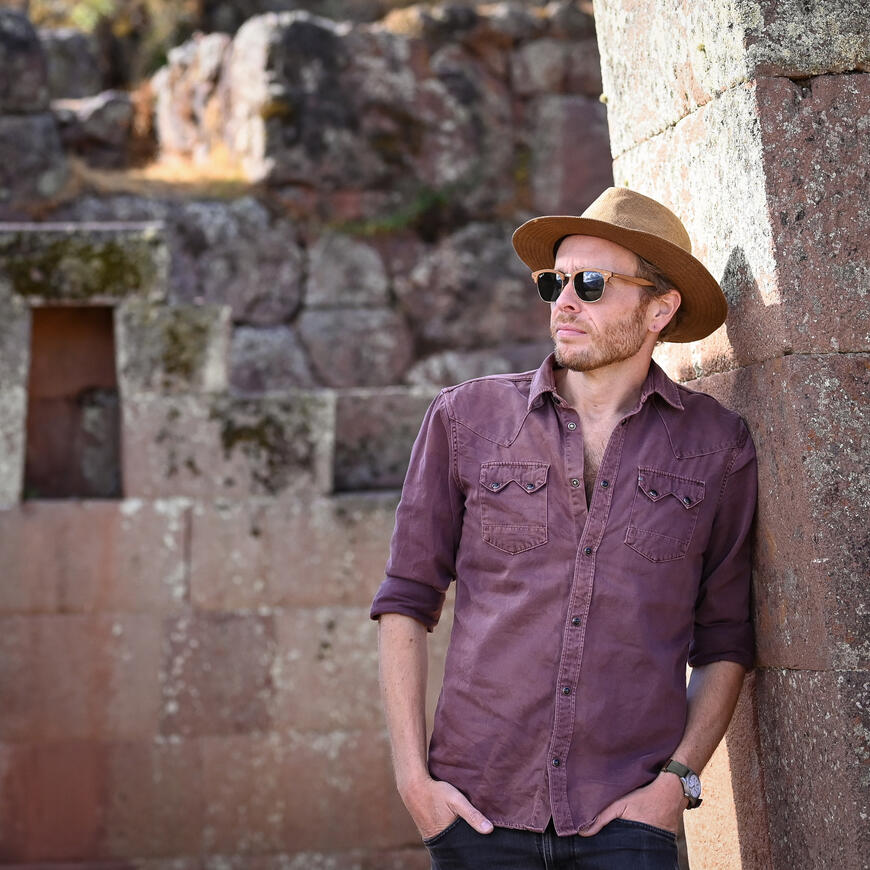
Teaching
I have extensive teaching experience across academic philosophy and the environmental humanities, and my approach often challenges hard boundaries between the humanities, social sciences, and natural sciences. I take pride in engaging students from a variety of backgrounds and experiences, and I place a priority in helping my students to find value and meaning in the content I teach within their own life experiences.My ten years of teaching experience is diverse, and has involved teaching assistantships for courses ranging from sustainable agriculture, to scientific reasoning, to social inequality. During my time at the University of Oregon, for example, I worked for courses in the Environmental Studies Program, the Department of Philosophy, the Department of Religious Studies, and the Department of Sociology.For more detailed information on the courses for which I have been the instructor of record, please see below. Most recently, I am teaching in the Department of Humanities, Arts, and Social Sciences at Illinois Institute of Technology.
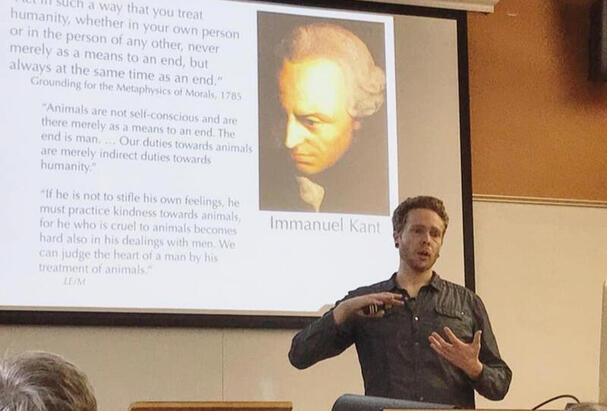
PHIL 380: Sports and Philosophy | Summer 2026
Illinois Institute of Technology
IIT Course PagePHIL 380: Philosophy of Waste | Spring 2026
Illinois Institute of Technology
This class is situated at the intersection of philosophical and ethical inquiry and the interdisciplinary field of discard studies. We explore discard, waste, and wasting not as simple given concepts, but rather as deeply entangled within broader systems of meaning. What is waste? What is valuable? What is disposable? What can be learned from paying closer attention to that which is often externalized from inquiry? What infrastructures is waste embedded in, and how does waste harm, benefit, and integrate itself into human and more-than-human life?
IIT Course PagePHIL 380: Animals and Philosophy | Fall 2025
Illinois Institute of Technology
This course considers philosophical questions focused on nonhuman animals and human interactions with them. Some key focus points include exploring the moral standing of animals, what and who animals are, and the diverse roles they occupy across societies. The class considers the legacy of Western thought regarding animals, as well as feminist and Indigenous perspectives which challenge approaches still pervading many contemporary debates. Engagement takes place through philosophical approaches in applied ethics, political and legal philosophy, metaphysics, and the study of interpretation (hermeneutics). Topical areas include domestication, companion animals, working animals, animal agriculture, research animals, animals in entertainment, urban animals, and wild animals. These topics will intersect with considerations of conservation and species extinction, waste and pollution, public health, and climate change.
IIT Course PageENVS 411: Multispecies Cities | Spring 2025
University of Oregon
This course is a survey of interdisciplinary studies on other species in the context of urban environments. Western understandings of the modern city often tie to dualistic assumptions that animals, plants, and “nature” exist outside human society. Cities are frequently understood as predominantly human habitats, and spaces of control and order with clear divisions between public and private. Yet, multitudes of other beings are present in urban spaces. Intersections of humans and other beings in cities are often framed negatively. Urbanization is cited as leading to habitat destruction, reduction in biodiversity, pollution, and increased hazards for other species. Conversely, species which adapt or thrive in cities may be interpreted negatively as pests or dangers themselves. We explore such intersections through an understanding that other species are not passive objects. Indeed, many species seek out urban spaces and do not simply adapt to circumstances. Other beings also co-shape urban landscapes. This brings into consideration the borders between nature and culture as cities simultaneously blur boundaries between humans and other beings while also often solidifying difference. Thus, this course will also challenge the perception of an inherent conflict and rigid dualisms between humans and other beings, particularly in the urban context. Cities and the number of humans living in urban settings are growing at profound rates. Therefore, intersections between humans and other species will continue increasing in such environments, and it is incumbent upon us to think critically about the role cities are playing and could play in such relationships.
UO Course PageENVS 203: Introduction to Environmental Humanities | Summer 2024
University of Oregon
This course surveys contributions from the humanities in relation to the environment and other species. Content draws from philosophy, history, English, law, arts, and more. Inquiry focuses on the plurality of perspectives on what constitutes the “environment” or “nature,” how we are to understand humans in relation to the environment and other beings, the framing of environmental issues, and discourse on the Anthropocene. Indigenous, Global South, and Global North contributions are explored in contrast and dialogue across diverse environmental topics. Thematic areas include the Anthropocene, Nature & Wilderness, Animals, and Environmental Justice.
UO Course PageENVS 345: Environmental Ethics | Winter 2024 & Summer 2022
University of Oregon
This course considers the moral complexities of human relationships with the environment. The field of Environmental Ethics tends to center on applied or practical considerations—meaning that, while theories are crucial, they must apply to questions, problems, and beings in the actual world. Through both dominant approaches in Western moral thought and consistent attention to ecofeminist ethical theory, we will be taking the applied nature of Environmental Ethics seriously. The overall structure of this course is designed to bridge the gap between theory and “the real world,” with a particular emphasis on moral questions around human relationships with other species.
UO Course Page: Winter 2024 | Summer 2022PHIL 335: Medical Ethics | Summer 2023
University of Oregon
This course serves as an introduction to ethics within the context of medicine and public health. The course begins with an overview of normative ethical theories, and then surveys of a variety of issues related to bioethics for the remainder of the class. We will explore topics including moral standing, abortion and reproductive rights, genetic engineering and reproductive technologies, animal ethics, disability, environmental justice, aging, and end-of-life issues. Topics consider the relationship between race, gender, class, ability, age, the environment, and human health.
UO Course PagePHIL 340: Environmental Philosophy | Spring 2022
University of Oregon
This course considers the nature and morality of human relationships with the environment and the more-than-human world. It begins with an introduction to contemporary discussions around the naming of our present geological epoch as the Anthropocene. This framing typically highlights the generalized human species as the dominating force of influence on this planet leading to ecological crisis/es. Many scholars have put forward alternative narratives which challenge a monolithic conception of humanity. However, one element notably absent from most discussions is what is to be made of this contested epoch beyond the human. Core to this course is challenging this absence and pushing us to (re)evaluate our understandings of what it is to be human in relationship to the environment, but also what it means to think of, for, and with the multitude of more-than-human others we share this planet with.
UO Course Page
Current Research
Street dogs and the Multispecies City
I am currently involved in a long-term multispecies ethnographic research project focused on ethical questions arising from the lives of free-ranging street dogs in Cusco, Peru. The project integrates ethnographic methods with animal ethics, environmental philosophy, and discard studies in an attempt to learn from street dogs themselves, who often defy easy categorization and challenge static and reductive ethical approaches within Western philosophy. A key component of this work involves visual anthropological methods using still and video photography. Research for this project was made possible, in part, through a generous grant from the Culture & Animals Foundation.
Past Projects
Scaling up Off-Grid Sanitation
From 2022 to 2025, I was an affiliated graduate co-researcher with the UK Global Challenges Relief Fund project, “Scaling up Off-Grid Sanitation.” This project was composed of an international and interdisciplinary group of researchers, and focused on a key problem related to addressing the global sanitation crisis in informal urban settlements, where water-borne sewage is not currently a viable form of sanitation management. Working at sites in Peru, South Africa, and Kenya, the project explored the feasibility of container-based sanitation (CBS) as a self-contained portable, accessible, and safe form of improved sanitation. A variety of approaches were applied to understand the perspectives of those who were and were not using this technology, and other stakeholders.
UK GCRF Project Abstract and Information
Upcoming publication associated with this project that I am co-author on:
Casas, Ana ; Hutchings, Paul ; Bell, Andrew Reid et al. "Beyond the Grid: Navigating Water Supply and Sanitation Service Ecosystems in Informal Settlements." In: PLoS ONE. 2026.
Academic Publications
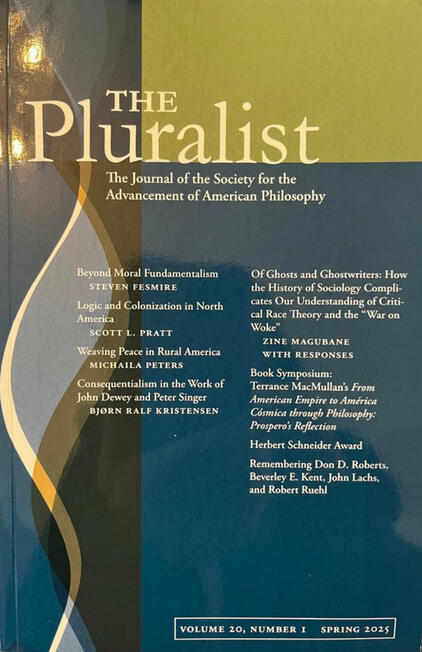
Consequentialism in the Work of John Dewey and Peter Singer: Considering the Case of Effective Altruism
The Pluralist 20 (1), 41-57 (Spring 2025)Link to Publication
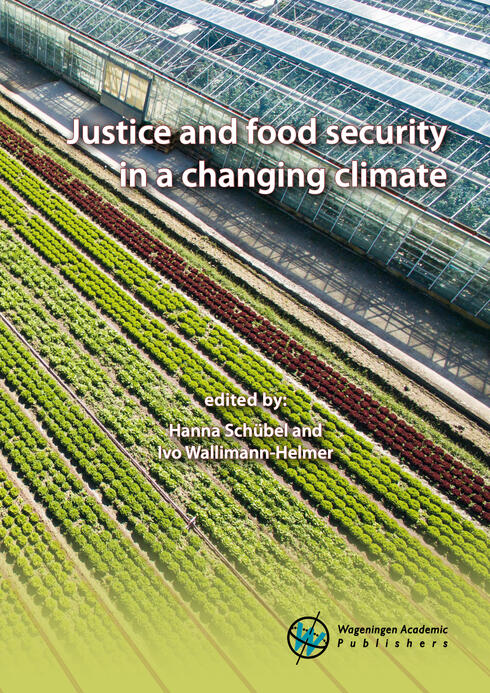
Viennese hamsters and the interspecies politics of urban space
Chapter 34 in Justice and food security in a changing climate (European Society for Agricultural and Food Ethics), eds. Hanna Schübel and Ivo Wallimann-Helmer, Wageningen Academic Publishers (2021)Link to Publication
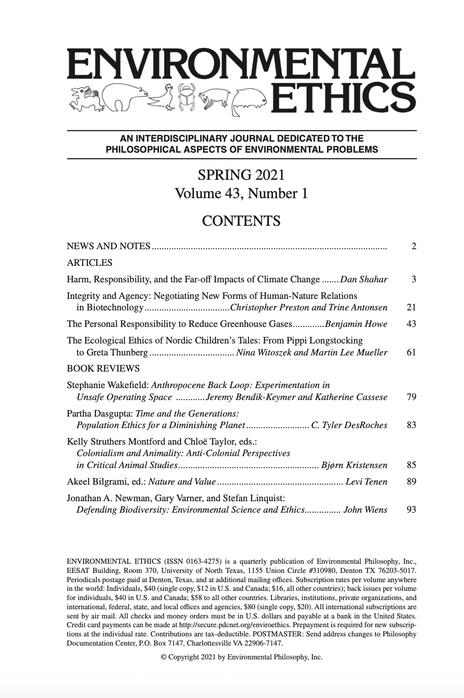
Book Review of Kelly Struthers Montford and Chloë Taylor, eds. Colonialism and Animality: Anti-Colonial Perspectives in Critical Animal Studies
Environmental Ethics, Volume 43, Issue 1, 85-88 (Spring 2021)Link to Publication
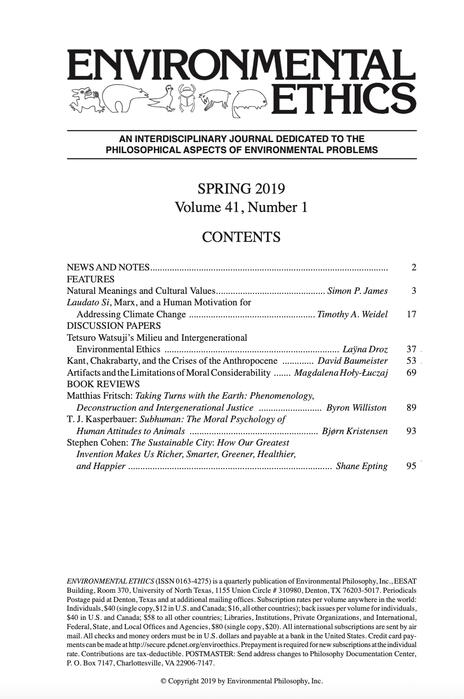
Book Review of TJ Kasperbauer: Subhuman: The Moral Psychology of Human Attitudes to Animals
Environmental Ethics, Volume 41, Issue 1, 93-94 (Spring 2019)Link to Publication
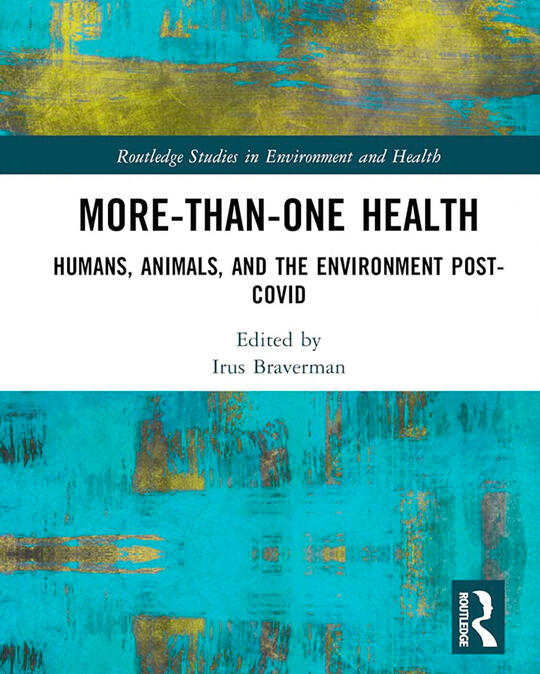
Anthrodependency, Zoonosis, and Relational Spillover
Chapter 10 in More-than-One Health: Humans, Animals, and the Environment Post-COVID, ed. Irus Braverman, Routledge (2022)Link to Publication
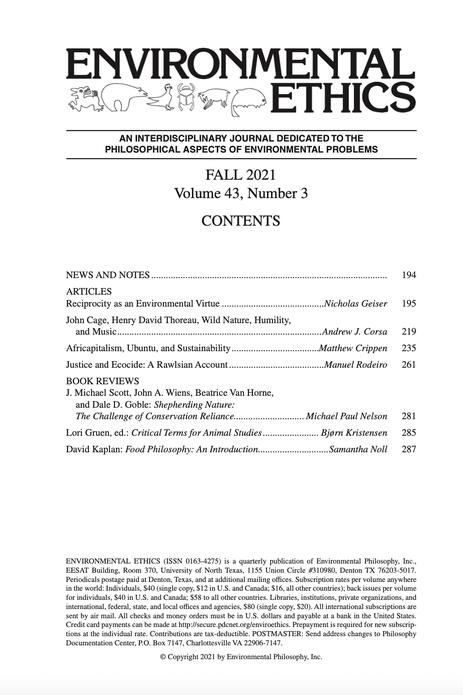
Book Review of Lori Gruen, ed. Critical Terms for Animal Studies
Environmental Ethics, Volume 43, Issue 3, 285-286 (Fall 2021)Link to Publication
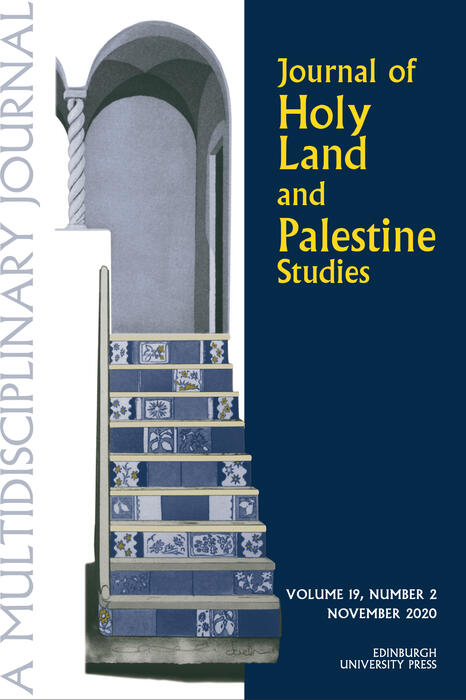
Book Review of Penny Johnson, Companions in Conflict: Animals in Occupied Palestine
Journal of Holy Land and Palestine Studies, Volume 19, Issue 2, 237-239 (November 2020)Link to Publication

Book Review of Philip J. Sampson, Animal Ethics and the Nonconformist Conscience
Reading Religion (American Academy of Religion), Volume 5, Issue 1, (December 2019)Link to Publication
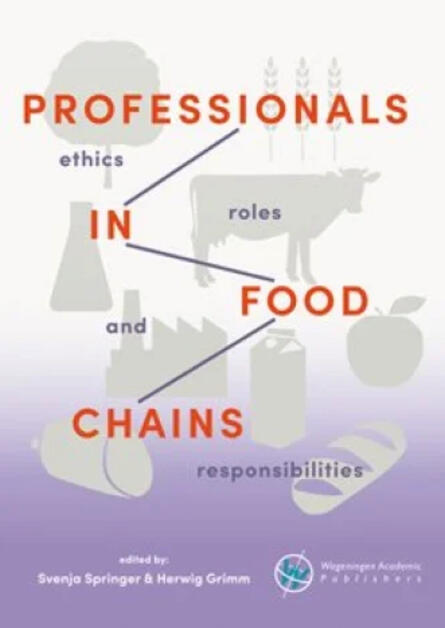
Toward the research and development of cultured meat for captive carnivorous animals
Chapter 22 in Professionals in Food Chains (European Society for Agricultural and Food Ethics), eds. Svenja Springer and Herwig Grimm, Wageningen Academic Publishers (2018)Link to Publication
Other Publications
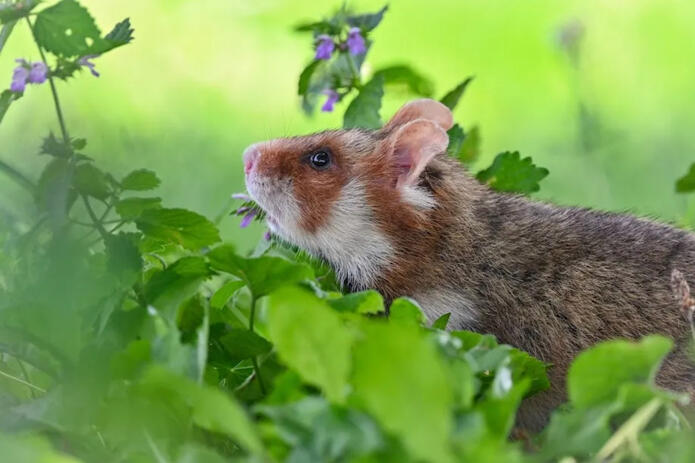
Rethinking Domestication Pathways in the Context of Anthrodependency
Published on Medium (March 2022)Link to Medium || PDF Available through Academia
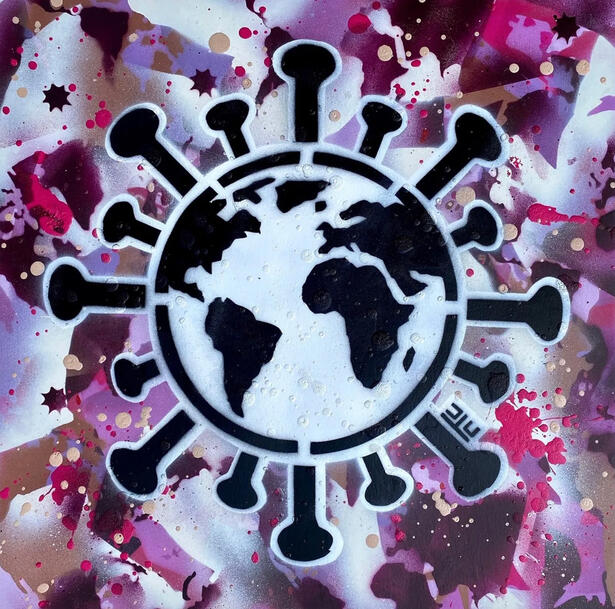
Welcome to the Viralocene: Transcorporeality and Peripheral Justice in an Age of Pandemics
Published on Medium (May 2020)Link to Medium || PDF Available through Academia
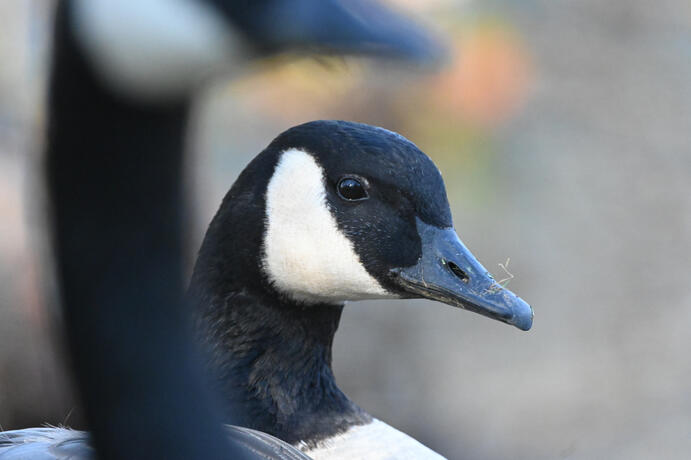
Plumwood’s Intentional Recognition Stance: More-than-Human Agency Beyond Conscious Intention
Published on Medium (November 2022)Link to Medium || PDF Available through Academia